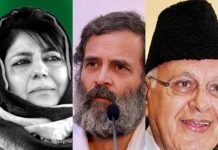In the past few days, Punjab has been rocked by the ruling Congress party’s move to introduce new history textbooks for Class XI and XII. On the surface, it seems as if the political parties are simply opposing the government’s move on a sentimental issue-that of deletion of chapters on Sikh Gurus and history in the new textbook. However, there is more to the issue than meets the eye.
 Indeed, it is not just a matter of parties going overboard with deletion of chapters on Sikh Gurus. Sources said there is another angle involved-that of book publishing. Making a change from the earlier practice, the Punjab government has decided to change syllabus and publish books on its own rather than depending on the private publishers. This perhaps is not to the liking of the private publishers as their business gets hit.
Indeed, it is not just a matter of parties going overboard with deletion of chapters on Sikh Gurus. Sources said there is another angle involved-that of book publishing. Making a change from the earlier practice, the Punjab government has decided to change syllabus and publish books on its own rather than depending on the private publishers. This perhaps is not to the liking of the private publishers as their business gets hit.
Corroborating this view, Punjab Finance Minister Manpreet Singh Badal alleged that private publishers were behind the entire ‘controversy’ over the book simply because their business was getting affected due to the books being brought out by the Punjab Education Board. Manpreet Singh said PSEB is an autonomous body and syllabus revision was an academic exercise. He said PSEB’s academic autonomy should be respected.
Badal said political concerns should not affect the debate on the textbook. He strongly refuted the charge that the Capt Amarinder Singh-led Congress government in Punjab was pursuing the Rashtriya Swayamsevak (RSS) agenda in Punjab.
The opposition-Aam Aadmi Party (AAP), as well as the Shiromani Akali Dal (SAD), were up in arms immediately with the introduction of new history textbook for Class XII even as the draft for the Class XI textbook was being finalised. Both Shiromani Akali Dal (SAD) and the Aam Aadmi Party (AAP) accused the Congress government of neglecting and sidelining Sikh gurus, as well as the glorious history and culture of the Punjabi community. SGPC also asked the Punjab government to review the book.
The leader of Opposition in Punjab, AAP party’s Sukhpal Singh Khaira even accused the Congress government of dancing to the tune of BJP government at the centre and willing to pander to its wishes. Khaira alleged that Amarinder had never spoken against the BJP and was also doing things at their behest. He also alleged that the CM, Capt Amarinder, was actually acting in this manner because of cases filed against his son-in-law and son.
Demanding a white paper on changes made in history books, Khaira said there were 22 chapters on Punjab history in the earlier Class-12 book, but only two chapters, ‘Towards Sikh Rule’ and ‘Punjab under British Rule’, had been devoted in the new book. “The history book has been reduced to 182 pages from 300 pages earlier. Only 20 pages have been devoted to Punjab history,” he said.
The strong opposition to the move finally forced the Punjab government to put on hold the further release of the Class XII history book till the newly constituted Oversight Committee examines it and decides on the way forward.
For the time being it looks like a damage control exercise by the Punjab government to check the hue and cry over the issue. However, it is unlikely that the issue will die down so soon. Earlier, the government set up a 6-member Oversight Committee, headed by eminent historian Prof. Kirpal Singh to review the book before its further release.
The government’s thinking was that it would be better for the panel to undertake a review of the book before its further release to avoid further controversies.
The Punjab School Education Board was directed to facilitate the committee for completing this task at the earliest. Besides, Prof. Kirpal Singh, the committee comprised of former Vice Chancellor Guru Nanak Dev University Prof. J S Grewal, former Pro-Vice Chancellor GNDU Prof. Prithipal Singh Kapur, Emeritus Prof. of History Panjab University, Prof. Indu Banga, two eminent historians to be nominated by the Shiromani Gurdwara Prabandhak Committee.
Incidentally, the Committee was asked to examine history syllabus of the Punjab School Education Board (PSEB) and to suggest corrections for factual and other errors if any, and to align, as may be practicably possible, the History syllabus with that prescribed by the NCERT. Besides, the committee was also asked to give suggestions for necessary corrections and improvement in the syllabus. Now, the 94-years-old committee head, Professor Kirpal Singh has gone on record to say discrepancies in Class XII were intentional. This may embolden the opposition attack on the government. The SAD, AAP and SGPC had raised objections that a major portion of Sikh history was removed from the Class XII book. If it was intentional, the question arises as to why and for what purpose?
Meanwhile, the Punjab government regretted ‘any mistakes’ in books, but denied deletion of chapters as alleged by the opposition parties. According to Punjab government, no deletion or pruning of content related to Sikh history had been done. The same content had been restructured and merged in a more cohesive format in a chronological order for better learning.
Till now PSEB was only prescribing the syllabus. Private publishers were printing books. Many of these books were guides with standard questions and answers. The board used to recommend some of these after evaluation by a group of three to four subject experts.
This is the first time PSEB published history textbooks for senior secondary classes. Earlier the students were totally dependent on books or ‘guides’ published by private publishers. The course has been aligned with the NCERT syllabus as is done in the case of physics, chemistry and maths, according to sources in Punjab government.
But why did the issue become controversial? The PSEB actually took a thematic approach. It restructured, realigned and merged chapters of the history syllabus for the two classes-XI and XII. Nine chapters related to history and socio-economic conditions of Punjab, Sikh gurus and their teachings, origin and growth of Sikh Misls and Maharaja Ranjit Singh’s conquests, which were part of Class XII course, were included in Class XI textbook which is still to come out. This led to confusion and misunderstanding.
letters@tehelka.com













